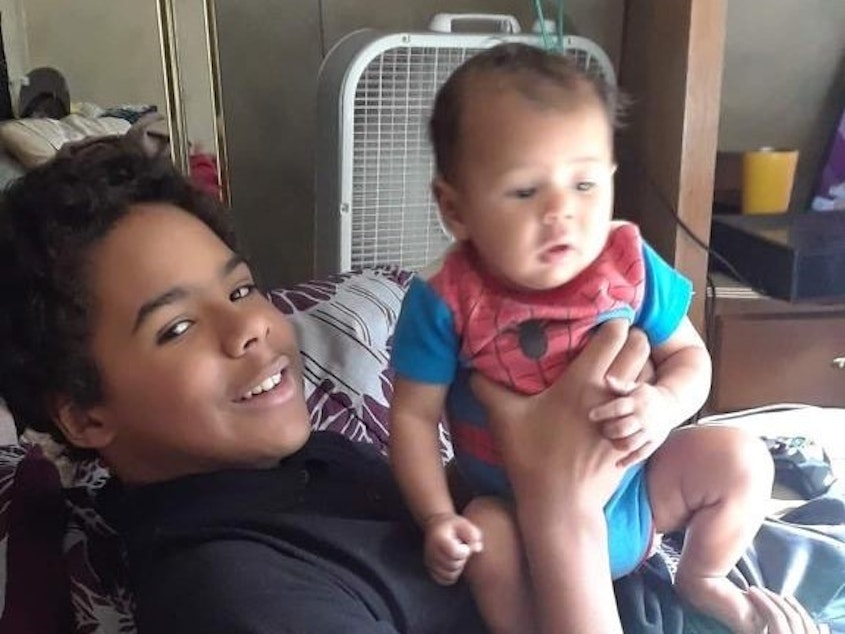Two moms look for housing for their 9 kids. They have money but 'we're stuck'

Valerie King, a mom in Thurston County, found herself in a jam.
She has money for housing, but she can’t find a place to live — it’s become that hard during the pandemic to find housing.
King has banded with another mom, Ashley Kendrick. They have nine children between them; the children have the same father, who is incarcerated.
“We’re a family, we’re a team,” King said. “We’re a blended family, we take pride in it. And at this point we’re stuck.”
There are several obstacles preventing King – and others like her – from getting housing. The state declared a moratorium on evictions to help people who can’t pay rent stay in their homes. But that also meant fewer vacancies.
“I had a voucher for 11 months and could not find a place,” King said. It’s a “rapid rehousing” voucher from the county that would cover her rent, if only she could find a landlord willing to accept it.
Sponsored
“What’s rapid rehousing if you’re not rapidly getting me rehoused?” she said.
Tom Webster, manager of Housing and Homelessness Prevention in Thurston County, doesn't dispute this. They issue vouchers that are intended to cover someone’s rent for up to two years.
“We’re able to fund these vouchers and give households the vouchers to go out and look for rental housing," Webster said. "But it’s a challenge to find someone who’s willing to rent to them.”

King has taken the lead on their fruitless search for rental housing.
Sponsored
“I have applied for over 75-100 applications, that’s at least a minimum of $16 to $45 in application fees,” she said.
She also pays for background checks through Zillow. Right now the family is staying in a Tumwater hotel, and King said time is running out.
King is Alaskan Native, and said she’s grateful that the Nisqually Tribe is paying for the family’s current hotel stay. She said the tribe is even willing to pay their first and last month rent if they can find a place to live.
“It’s become even tougher with Covid, we’ve seen less turnover in rental units,” Webster said.
The number of households using the vouchers in Thurston County declined by 15% over the past year, Webster said, to 328 households last September. In 2020, according to the Runstad Center for Real Estate Studies at the UW, Thurston County had an overall vacancy rate of 4%, lower than Pierce and King Counties.
Sponsored

At the same time, Webster said the county has lost nearly a quarter of its shelter beds due to Covid precautions, from 420 to 335. They’ve relied more heavily on hotel vouchers, especially for families.
Carrie Graf, a staff attorney with the Northwest Justice Project in Olympia, said the pandemic is compounding housing problems that already existed.
“We call them ‘barriers to housing’ situations where people have a criminal record, an eviction record or even just poor credit and it makes it almost impossible to find landlords willing to rent to them,” she said.
She noted that applicants are entitled to a decision in writing from each landlord, which can sometimes provide grounds for an appeal.
Sponsored
King’s family faces a “perfect storm” of those barriers. She said she’s improved her credit score and worked to overcome a criminal record that includes a felony conviction for being a passenger in a stolen car.
But she said the size of their extended household has made shelters and landlords reluctant to have them. She said they were forced to leave another Tumwater hotel last May in the middle of the night for nonpayment.
“We slept in the car outside in the parking lot, actually,” she said. “And my significant other at that time, he was actually outside with our belongings, because the children were in the car with me.”
King said they’d been at the hotel for three weeks, with most of their stay paid for by the federal CARES Act.
If so, they should have been covered by the state’s eviction moratorium, which also applies to hotel guests after 14 days.
Sponsored
Graf, the housing attorney, said, “We know [hotels] may not think of themselves as landlords necessarily, but under the moratorium they are providing residential housing and they can’t evict people even if they’ve fallen behind on rent.”
The hotel’s manager said she wasn’t there last May and couldn’t confirm their account.
Meanwhile King is trying to cobble together money to extend their current hotel stay. But she has no idea what’s next. And school is back in session.
“We have a hotspot from the school district,” she said. “But where am I going to plug the laptops in at? I’ve got six different kids in six different grades.”
The kids attend schools in Lacey and Tumwater, where they are receiving some in-person services.
Hedrick works at a fast-food restaurant in Tumwater. King said she had a cleaning business that closed when the pandemic started. She’s studying at Clover Park Technical College.
King said she’s applied for housing across multiple counties, and the family is willing to go anywhere they can find shelter.
“I am convinced I will never find a place to begin a foundation of stability for my blended family,” she said.
Contact KUOW reporter Amy Radil at aradil@kuow.org.




